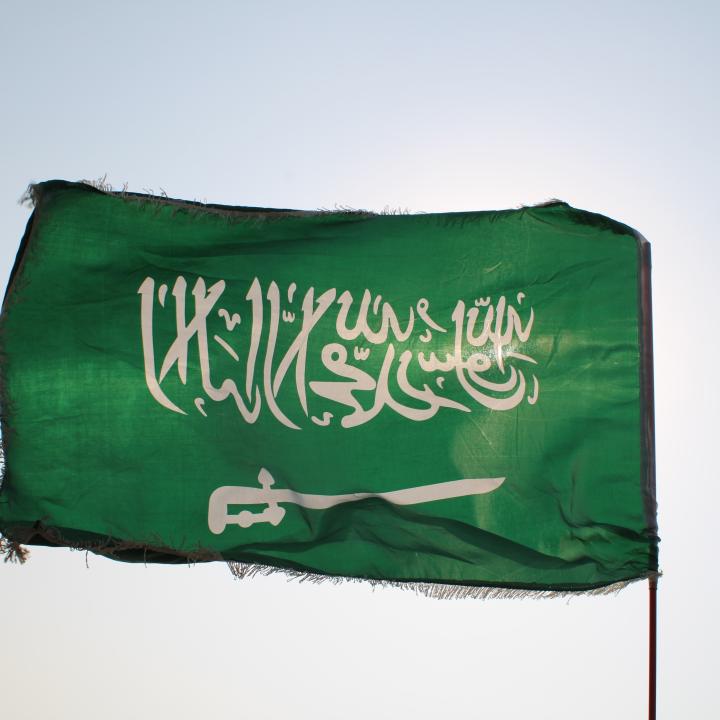
- Policy Analysis
- Fikra Forum
New Saudi Poll: Some Surprises on the U.S., Iran, Israel, Oil, and More

Saudis voiced their thoughts on global partners, internal dynamics, and regional issues, including opinions on the Iranian protests and nuclear dilemma.
A rare public opinion poll of Saudi citizens, commissioned by the Washington Institute and conducted by a regional commercial firm in November 2022, reveals some unexpected findings about the most salient global and domestic issues.
Both China and Russia Now Edge Out U.S. in Popular Appeal, Despite Ukraine War
For the first time since these polls started nearly a decade ago, the United States today clearly lags behind its two main global rivals in perceived importance to the Saudi public. The majority (57%) view good relations with China as “important” to Saudi Arabia. Russia is a close second, at 53 percent. Yet at the same time, contrary to common misconceptions, Saudis solidly disapprove of “the Russian military actions in Ukraine.” Three-quarters (73%), even more than in two earlier polls this year, say these actions are having “negative effects on our region.”
The United States trails significantly, with just 41% of Saudis saying good ties with Washington are important. These findings are in line with responses to a subsequent question explicitly comparing the three major outside powers. The majority (61%) of Saudis, as in previous recent surveys, continue to agree at least “somewhat” with this proposition: “We cannot count on the United States these days, so we should look more to other countries like China or Russia as partners.”
Iran Still Widely Disliked, Yet Surprising Caution on Protests There and on Nuclear Option
As in past polls, only a small minority (15%) of Saudi citizens say good relations with Iran are even “somewhat important” to their country. Significantly, too, that percentage is only modestly higher (23%) among the roughly one-tenth of Saudis who are Shiites, and concentrated mostly in the oil-reach Eastern Province across the Gulf from Iran.
Nevertheless, the Saudi public as a whole appears unexpectedly cautious regarding major recent developments in Iran. Just one-third (35%) expect the ongoing anti-government protests there to have even a somewhat positive effect on the region. And only a marginally higher proportion (40%) agree with this deliberately blunt assertion, asked here for the first time: “Now that Iran is so close to getting a nuclear bomb, it’s time for an Arab country to get one too.” A mere 13% of the total agree “strongly” with that assertion.
Nearly Half Continue to Accept Contacts with Israel, Though Most Decry Netanyahu’s Election
Popular attitudes toward contacts with Israel remain mixed, as in other recent polls. The proportion of Saudi citizens who accept such contacts is holding steady, currently at 43 percent. In a key counter-intuitive finding confirming previous results, that proportion is almost identical among the older (30+) and younger generations of Saudi adults today. And almost exactly the same percentage (41%) also say that “the agreement on a maritime boundary between Lebanon and Israel” will have positive regional implications. In line with this sentiment, at around the time of the survey, Saudi Arabia hosted a prominent Israeli banker at a major investment conference in Jeddah, and an Israeli sports team at a tournament in Riyadh. This week, the major Saudi media outlet Al-Arabiya featured a long, “exclusive” interview with Israeli prime-minister-designate Netanyahu, at least on its English-language homepage.
The above figures, however, are approximately double the percentage who say that the Abraham Accords are already having positive effects on the Middle East. That percentage remains low, at 21 percent. Moreover, in an unusual display of consensus, 90% of Saudi citizens say that “the outcome of the latest Israeli national election on November 1”—in which Benjamin Netanyahu was returned to power with a clear majority coalition—will have negative effects on the region.
Few Fault Government on Economy, But Half Want Less Corruption and More Responsiveness
Only 21% of Saudis say their government is doing “too little” at “meeting people’s needs for an acceptable standard of living.” Furthermore, three-fourths—far more than in some other Arab societies surveyed lately—agree with this assertion: “It’s a good thing we don’t have mass protests against the government, as in some other countries.
Nevertheless, responses to related questions demonstrate that many Saudis are willing to criticize some of their own government’s efforts, at least in private. Around half (54%) say Riyadh is doing “too little” at “reducing the level of corruption in our economy and public life.” Very nearly the same proportion (56%) also say their government is doing too little about “paying attention to the opinions of ordinary citizens like me”—even though Saudi authorities do read polls and analyze social media extensively to keep a finger on the popular pulse.
No Surprise: Qatar World Cup Crushes Cairo Climate Conference in Popular Appeal
Not surprising, in sharp contrast, is the nearly universal approval for the FIFA World Cup tournament in neighboring Qatar, which was just getting underway as this survey took the field. The vast majority (89%) of Saudi citizens voice a favorable opinion of this event. By comparison, fewer than half (47%) think that the UN Cop 27 Climate Conference in Cairo, also held in November, will have any positive implications for the region as a whole.
Methodological Note
This analysis is based on findings from a personal-interview survey of a nationally representative sample of 1,000 Saudi citizens, conducted in November 2022 by a highly experienced, independent regional commercial company. The sampling was done according to standard geographical probability procedures, yielding a statistical margin of error of approximately 3 percent. Strict quality controls and assurances of confidentiality were provided throughout. Full results can be viewed on The Washington Institute’s interactive polling data platform. Additional methodological details, including demographic breaks and other relevant information, are readily available on request.



